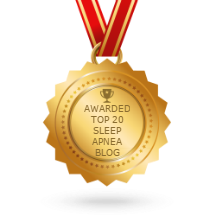Author Archives: Carol Brennan

Check Out These 5 Summer Sleep Tips
Essential Summer Sleep Tips
by Maria Luci, editor at Maria’s Farm Country Kitchen and Rodale’s
Are you sure/That we are awake? It seems to me/That yet we sleep, we dream…
— William Shakespeare, A Midsummer Night’s Dream
Unlike the spellbound, dozing characters in Shakespeare’s beloved comedy, many of us wish we could get in a few more hours of dreaming each night. Yet, a serene, uninterrupted eight hours can be hard to come by, especially during hot midsummer nights.
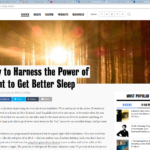
How Light Has An Affect On Your Sleep
Can You Harness Light To Get Better Sleep?
Modern life is all about innovating our way out of our inabilities. We’re not meant to fly, or live 20 stories in the air, or speak to a friend in New Zealand. And (buzzkill alert) we’re not meant to be awake when the sun don’t shine. Of all that we can now do, the latter may be the most universal. If we’ve mastered anything, it’s light. For the large part, this is good news; extra hours in the “day” mean we can socialize longer and get more work done.
Trouble is, evolution has programmed the human body to equate light with wakefulness.

Sleep Can Help Manage Your Diabetes
Poor Sleep = High Blood Glucose Levels?
Often, people with diabetes blame what they ate or their inactivity as the culprit for an out-of-range blood glucose level. But there are other health behaviors that can affect blood glucose levels, and poor sleep habits is a common – and maybe unnoticed – one.

Should We Actually Be Sleeping Twice A Day?
Sleeping Once A Day? How about Twice?
This time, we’re all doing it wrong. Well, except for a handful of Spanish people that still enjoy a siesta after lunch.
Experts believe that the reason we’re all constantly whingeing about lack of sleep is because we should actually be doing it twice a day, for shorter bursts.
Did someone say siesta?
The idea that we should all be trying for a continuous eight hours of sleep at night is, experts argue, a recent invention, and our body clocks are far better suited to two shorter bursts of sleep each day.
In fact, so-called segmented, or bi-modal, sleeping used to be the norm, argue Dr Melinda Jackson, a psychologist who specialises in sleep disorders at RMIT University, and Siobhan Banks, sleep researcher at the University of South Australia.
‘Anthropologists have found evidence that during pre-industrial Europe, bi-modal sleeping was considered the norm,’ they explained in an article this week for the Conversation.
For example, in Charles Dickens’ Barnaby Rudge (published in 1840), he refers to the concept of a first and second sleep, writing:
“He knew this, even in the horror with which he started from his first sleep, and threw up the window to dispel it by the presence of some object, beyond the room, which had not been, as it were, the witness of his dream.”
People’s bedtime wasn’t determined by time of day, but by what they had to do and when.
‘Interestingly, the appearance of sleep maintenance insomnia in the literature in the late 19th century coincides with the period where accounts of split sleep start to disappear,’ Jackson and Banks go on to note.
To read the rest of this article, click here:
You can buy CPAP Machines, tubing and all of your CPAP supplies at CPAP America, 943 Kings Highway, Suite 503, West Deptford, NJ 08066. Feel free to contact us at 1-800-569-0167.
You can also reach us via email here.
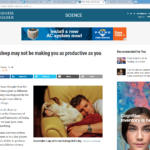
More Sleep Isn’t Always A Good Thing?
When is more sleep a bad thing?
It has long been thought that the amount of time spent in different stages of sleep was responsible for how well people were able to remember things.
But a new study done by researchers at the University of California and University of Padua shows that we may have been missing something.

What We Can Learn From Animals About Sleeping
Sleeping is a basic part of our everyday lives, yet surprisingly little is known about its purpose and evolutionary history.

Is It Possible To Sleep Through Insomnia?
Insomnia:
YOU know you’ve been awake for hours, but you dare not check the little electronic numbers on your bedside clock for fear of inducing a wave of panic.
You don’t need to look anyway, because you know exactly what they will say: “It’s early in the morning and you will be exhausted tomorrow.”
Your partner’s snores are usually a mere irritant, but in that quiet, liminal world of insomnia they take on a horrific, maddening dimension. Why can everyone else sleep except you?
If these mental roundabouts sound familiar, then take heart: you are most definitely not alone.
In homes across the state, there are plenty of Victorians burning the midnight oil, not because they have a herculean-like stamina, but because they are at war with their desperately tired bodies that refuse to drift off to sleep.
So, what exactly is insomnia? And how do you know if you have it or are just going through a phase?
Insomnia is defined in the fifth edition of the American Psychiatric Association’s Diagnostic and Statistical Manual of Mental Disorders as difficulty getting to sleep, staying asleep or having non-restorative sleep (despite opportunity for sleep), together with associated impairment of daytime functioning, with symptoms being present for at least four weeks.
Dr David Cunnington, Melbourne Sleep Disorders Centre director, differentiates between two types: acute and the less-common chronic iteration.
“Acute insomnia is where there are a certain set of circumstances that are causing sleeplessness, such as stress or illness, and this could last for a few days, sometimes a few weeks, but after that it passes,” Cunnington says.
To read the rest of this article, click here:
You can buy CPAP Machines, tubing and all of your CPAP supplies at CPAP America, 707 Mantua Pike, West Deptford, NJ 08096. Feel free to contact us at 1-800-569-0167.
You can also reach us via email here.
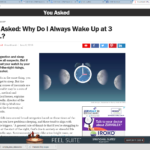
Waking Up From Sleep At 3 A.M.? You’re Not Alone
Age, indigestion and sleep apnea are all suspects. But if you can set your watch by your middle-of-the-night risings, blame alcohol.
It all results in the same thing: you just can’t get to sleep. But the underlying causes of insomnia are multiple, and it may be a mix of biological, medical and psychological issues, explains Michael Perlis, director of the Behavioral Sleep Medicine Program at the University of Pennsylvania.
Insomnia falls into several broad categories based on those times of the night when you have problems sleeping, and these tend to align with predictable triggers. “A general rule of thumb is that if you’re struggling to fall asleep at the start of the night, that’s due to anxiety or stressful life events,” Perlis says. Environmental issues—like a too-bright room, or staring at device screens—can also mess with your ability to fall asleep.
On the other hand, Perlis says depression is linked with “late insomnia”—the kind that wrests you from sleep so late in the night that you’re forced to rise early for the day.
When it comes to “middle insomnia,” which forces your eyes open a few hours after you’ve fallen asleep, Perlis says two common medical conditions are often to blame: gastroesophageal reflux disease, or GERD, and sleep apnea. “In the case of sleep apnea, you wake up because you’ve stopped breathing,” he explains. “With GERD, you wake up because stomach acids are burning your esophagus.”
Even the healthiest sleepers wake a few times during the night, though for the most part you’re not awake long enough to remember them, Perlis says.
To read the rest of this article, click here:
You can buy CPAP Machines, tubing and all of your CPAP supplies at CPAP America, 707 Mantua Pike, West Deptford, NJ 08096. Feel free to contact us at 1-800-569-0167.
You can also reach us via email here.

Even LeBron James Is Affected By Sleep Loss
The worst sleep LeBron James has ever had in his 13 years in the NBA was in the aftermath of the 2011 Finals.
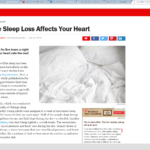
Sleep Loss Can Affect Your Heart
Getting too little sleep has been shown to have bad effects on the heart, and many studies have linked it to hypertension. Now, a small new study published in the journal Hypertension finds that shortened sleep is connected to some negative markers, especially when it occurs outside of typical nighttime hours.

